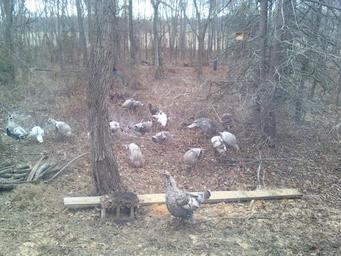Our Farming Practices

Domestic turkeys freely wandering through our woods
First, we'll insert a disclaimer. We have known many friends and neighbors who practice conventional farming. We respect them, we get along with them, and we don't think they're evil. They do the best they can to produce their crops, be they animal or plant. They take care of their land as best they can and they care for their animals. We just have a different understanding and practice.
We practice Sustainable Agriculture, not perfectly, but we're working at it. Sustainable does not equal organic. There are some shared attributes, but there are many "Organic Farms" that are single crop producers, which is not sustainable farming. However, there are also many organic farms that are truly sustainable.
Basically, sustainable farming
- limits or eliminates the use of chemicals;
- is sensitive to the environment, both generally and locally, growing only what grows well in that climate, using water and land resources wisely, taking advantage of natural land features, hedgerows and windbreaks;
- doesn't house more animals than the land can sustain, returns manure to the land, practices livestock diversity, and treats animals humanely;
- reduces fossil fuel dependency by farming practices, even sometimes including using animal instead of tractor powered farming, and sell locally;
- are often highly involved in their local communities and support the local economy by not only selling locally but also buying locally.
At Maggie's Farm at Mulberry Creek we are always working toward being more sustainable in our farming and in our lifestyle. While we may need to become USDA Certified Organic in the future, at this current point in time we believe that being Sustainable is as good for the environment, animals, and people as being organic.
* We raise many open-pollinated varieties of vegetables, which then allows us to save our own seed, some of which are heirlooms. We're constantly working toward returning waste from animals and plants back to the ground on the farm and relying less on manufactured chemical-based fertilizers and fossil fuels. We use chemicals only in a rescue situation: meaning that we only use chemical pesticides or fertilizer if the entire crop is threatened.
* We raise most of what we eat and drink ourselves. What we are not able to grow, we do our best to purchase from other local farms that uphold our idea of sustainable farming. What we can't find locally, we do have to find at the store. However we read the labels of everything we buy to make sure we're putting the best possible things into our body that is the least processed version.
* We treat all our animals humanely, which means we don't cut bits off them that God put there any more than we have to. We do castrate males who will not be used as breeding stock as that's one way of protecting both them and the females. We also allow our animals to range and behave as they are naturally inclined to, within limits. For instance, our chickens have taken care of our tick problem because they have free-range over the farm eating anything and everything they want. Except we do try to keep them out of the garden. Sometimes it works. We do have to confine animals from time to time, generally for breeding purposes, and for no longer than is necessary. When butchering time comes, we thank our animals for what they've given us while on the hoof.
We address some of these issues elsewhere on this site and welcome conversation and questions.